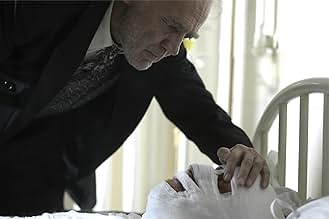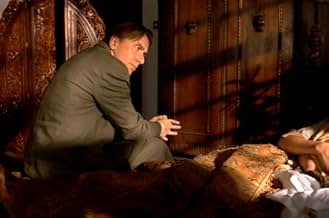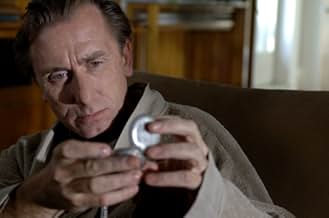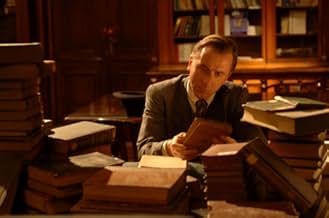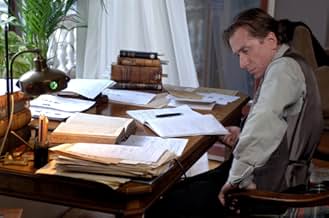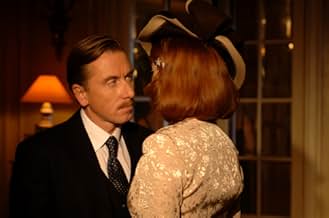IMDb RATING
6.1/10
15K
YOUR RATING
A love story wrapped in a mystery. Set in World War II Europe, a professor is changed by a cataclysmic event and explores the mysteries of life.A love story wrapped in a mystery. Set in World War II Europe, a professor is changed by a cataclysmic event and explores the mysteries of life.A love story wrapped in a mystery. Set in World War II Europe, a professor is changed by a cataclysmic event and explores the mysteries of life.
- Director
- Writers
- Stars
- Awards
- 1 win & 1 nomination total
Dan Astileanu
- Professor
- (as Dan Astilean)
- Director
- Writers
- All cast & crew
- Production, box office & more at IMDbPro
Featured reviews
I was flabbergasted to see that a lot of the comments for this film were negative. The fact that the movie is not of a commercial nature doesn't make it bad, it just makes it less accessible. In this manner, it is just as bad for movies as a science paper is for publications.
Anyway, the film is based on a book of Romanian Mircea Eliade, one that I didn't read. Actually, I didn't read most of Eliade's work for the very reasons people bad mouthed this film. Then I entered adolescence :-P.
The film, though, is a resounding success to me. Not only that it is well done, but at the end of it, it let me wanting to understand more and to read the book. Maybe I will one of these days. As the film is impossible to summarize here, I will get to a quick conclusion.
Bottom line: a heavy feeling film, with a complex script and a lot of philosophical ideas of Eliade's scattered through the story; also some of his personal obsessions: orientalism and the loss of the love of his life. I personally think it was a great movie, but it became a bit confused at the end.
Anyway, the film is based on a book of Romanian Mircea Eliade, one that I didn't read. Actually, I didn't read most of Eliade's work for the very reasons people bad mouthed this film. Then I entered adolescence :-P.
The film, though, is a resounding success to me. Not only that it is well done, but at the end of it, it let me wanting to understand more and to read the book. Maybe I will one of these days. As the film is impossible to summarize here, I will get to a quick conclusion.
Bottom line: a heavy feeling film, with a complex script and a lot of philosophical ideas of Eliade's scattered through the story; also some of his personal obsessions: orientalism and the loss of the love of his life. I personally think it was a great movie, but it became a bit confused at the end.
Francis Coppola's last mainstream Hollywood film was The Rainmaker and before that it was the critically maligned Jack. Since then the legend of cinema has walked away from being a director for hire. I guess he is still smarting from the failure of his Zoetrope Studios.
In Youth without Youth Coppola turns to European art cinema and not for the first time. His black and white Rumble Fish was heavily influenced by the German Expressionist style.
Tim Roth plays Dominic a 70 year old man in Pre World War 2 Romania, who is struck by lightning and is rejuvenated astounding his doctor (Bruno Ganz).
Dominic is 30 years younger with a regenerated body, he even grows new teeth, he undergoes various tests put to him by his doctors. However it is not only the physical body that has improved, also his mental faculties have gone through a quantum leap. This also arouses the interests of the Nazis once the war erupts.
Of course Dominic hides that he has an alter ego that converses with him and seems to have enhanced powers himself. Also whereas the older Dominic was striving to finish his life's work in the origins of linguistics, now he has the time to research and write further. He speaks many Oriental languages now he can read by just looking at a book.
As the war rages on Dominic escapes to Switzerland to continues his research. In the 1950s, a meeting with a woman called Veronica who reminds him of Laura, a lost love turns the film further on its head. Veronica transmigrates to another soul back in time such as an early disciple of Buddha in ancient India. She keeps going back further in time speaking in ancient languages enabling Dominic to get very near to the first spoken text but at the risk of losing Veronica for good.
The film is a mixture of vision and story. It could easily be something that could had been made by that other American filmmakers Terrence Malick or David Lynch. The film sets its stall out with the European Art-house cinema style, it is not a literal movie as the film feels dreamlike. You do wonder if this is all a dream of Dominic after being struck by lightning.
The film is little known but I was surprised by how accessible it was and how much I enjoyed the film. Coppola has never been afraid to experiment and at times he has misfired badly. Even here some of the scenes set in India does not convince as they are too modern with modern cars driving past. There is even a shot of The Taj Mahal Palace Hotel in Mumbai that crops up in scenes set in Uttar Pradesh.
However this is an intriguing, experimental even a slightly unnerving film. Roth should be given plaudits for drawing the viewer in and keeping them invested in his character.
Youth without Youth shows the world that Coppola is still a master filmmaker.
In Youth without Youth Coppola turns to European art cinema and not for the first time. His black and white Rumble Fish was heavily influenced by the German Expressionist style.
Tim Roth plays Dominic a 70 year old man in Pre World War 2 Romania, who is struck by lightning and is rejuvenated astounding his doctor (Bruno Ganz).
Dominic is 30 years younger with a regenerated body, he even grows new teeth, he undergoes various tests put to him by his doctors. However it is not only the physical body that has improved, also his mental faculties have gone through a quantum leap. This also arouses the interests of the Nazis once the war erupts.
Of course Dominic hides that he has an alter ego that converses with him and seems to have enhanced powers himself. Also whereas the older Dominic was striving to finish his life's work in the origins of linguistics, now he has the time to research and write further. He speaks many Oriental languages now he can read by just looking at a book.
As the war rages on Dominic escapes to Switzerland to continues his research. In the 1950s, a meeting with a woman called Veronica who reminds him of Laura, a lost love turns the film further on its head. Veronica transmigrates to another soul back in time such as an early disciple of Buddha in ancient India. She keeps going back further in time speaking in ancient languages enabling Dominic to get very near to the first spoken text but at the risk of losing Veronica for good.
The film is a mixture of vision and story. It could easily be something that could had been made by that other American filmmakers Terrence Malick or David Lynch. The film sets its stall out with the European Art-house cinema style, it is not a literal movie as the film feels dreamlike. You do wonder if this is all a dream of Dominic after being struck by lightning.
The film is little known but I was surprised by how accessible it was and how much I enjoyed the film. Coppola has never been afraid to experiment and at times he has misfired badly. Even here some of the scenes set in India does not convince as they are too modern with modern cars driving past. There is even a shot of The Taj Mahal Palace Hotel in Mumbai that crops up in scenes set in Uttar Pradesh.
However this is an intriguing, experimental even a slightly unnerving film. Roth should be given plaudits for drawing the viewer in and keeping them invested in his character.
Youth without Youth shows the world that Coppola is still a master filmmaker.
A complex and challenging film, from one of the great American directors, and part of the continuing magical adventures of Tim Roth(The Legend Of 1900), this time around Roth is a linguistics professor trying to develop a theory of the origins of hum...(read more)an language and consciousness at his 70th birthday when he is struck by lightening that reverts him to his youth. Not only is he younger, but he discovers he can read whole books in minutes, see into dreams, and in the films most outlandish moments some limited telekinesis(but in all fairness it's his only way to stop an evil Nazi scientist who wants to jump start human evolution through electro shock). From there our hero meets a women who resembles one he used to know, who is similarly struck by lightening or near lightening which causes her to regress into previous lives. Naturally the two fall in love, and the odd couple are happy enough until her ancient language fits, get more frequent, and dive further and further into primitive languages, much to Roth's joy, though his love ages more and more with each regression.
Like I said Youth Without Youth is an ambitious mix of science fiction, world war 2 spy espionage, romance, meditation on death, aging, linguistics, the origins of consciousness, time, philosophy, the atomic bomb, multiple personalities, and reincarnation.
Watching Youth Without Youth is a bit like reading an overwrought but well written novel, where you can appreciate the skill of the speaker's use of language more than any profound statement being made. Not that Coppola's subjects are not profound, or treated, so, just that's it's done in such a way that at first view it's going to go over just about everyone's head. Author Mircea Eliade, is better known as a religious historian and academic, whose work is as rigorous as his fiction offerings. This is a well made and well performed film, but it's zeal gets ahead of itself on more than one occasion.
Like I said Youth Without Youth is an ambitious mix of science fiction, world war 2 spy espionage, romance, meditation on death, aging, linguistics, the origins of consciousness, time, philosophy, the atomic bomb, multiple personalities, and reincarnation.
Watching Youth Without Youth is a bit like reading an overwrought but well written novel, where you can appreciate the skill of the speaker's use of language more than any profound statement being made. Not that Coppola's subjects are not profound, or treated, so, just that's it's done in such a way that at first view it's going to go over just about everyone's head. Author Mircea Eliade, is better known as a religious historian and academic, whose work is as rigorous as his fiction offerings. This is a well made and well performed film, but it's zeal gets ahead of itself on more than one occasion.
In "Heart of Darkness: A Filmmaker's Apocalypse", a brilliant documentary about making of "Apocalypse Now", Francis Ford Coppola said he was on a learning process while making that film, as he delved into mysteriousness of jungle. In the end, his on-screen works is like a reflection to his own experience. Many years later (20 years to be exact) and 10 years absent from his latest directorial effort (1997's "The Rain Maker"), Coppola tried to do exact same thing like he did in the past.
"Youth Without Youth" is interesting, yet undeniably confusing tale of Dominic Matei (Tim Roth) who is a professor of language and philosophy in early 19th century. His goal is trying to accomplish a research that he claims to be the key of all human's language. But as it turns out, it might be impossible to finish it after all. This research changed his behavior from fascination into obsession. As he lose everything he loves including his fiancé, Veronica (Alexandra Maria Lara), he has nothing left to live on. Many years later, in a blink of World War II, 77-years-old Dominic is on the way to end his miserable life. But then, lightening suddenly stuck at him before he has a chance to do so. The lightening didn't kill him, instead it miraculously rejuvenates his life. Now, he looks like in mid-30's and gave him a supernatural abilities like reading book without open it, mind bending psychic or even developing his own Dr. Jerkyll and Mr. Hyde-like ultra-ego.
After World War II's over, Dominic is traveling throughout the world. He began to look into his research again since now he has a plenty of times to do. But then, he accidentally met his fiancé's dead ringer named Laura (also played by Alexandra Maria Lara). As it turned out, she also happened to be stuck by lightening and develops another supernatural ability which she can speak ancient languages while she slept. Dominic knows right away that it might be an only chance for him to accomplish his unfinished project. But it came with one sacrifice condition, if he decides to stay with her, it might be the way to ending her life.
There's an only one different thing between getting lost in the jungle of Philippines and getting lost in freezing cold city of Romania. And that is "Youth Without Youth" lose its audience's commitment as we keep accompany him to his personal enlightenment (in another words, he wasn't wholeheartedly let us ride along in this time around). With his beyond comprehensible dialogs about metaphysical theory and non-linear stories that keep tangled up like a maze, Youth Without Youth seem to be a failure. No, it's magnificent failure from the master of modern cinema living today.
The cast is another story here, since they served their duty pretty well especially Tim Roth (again, one of the most unused actor living today) who would do all it take to make us believe in the protagonist. And he seemed to really understand what Francis Ford Coppola is trying to achieve. The movie also accompanied by beautiful score (if shamelessly cloying) by Osvaldo Golijov and surprisingly neat cinematography by Mihai Malaimare Jr.
"Youth Without Youth" require a multiple viewing, in order to understand some of its massages. Truth be told, I didn't really get it. Coppola once said in the interview that this story is very personal to him. Well, maybe this film wasn't exactly making for us. It's sure gonna make a lot of people frustrated. For me, I'm just glad that he's back to work again.
"Youth Without Youth" is interesting, yet undeniably confusing tale of Dominic Matei (Tim Roth) who is a professor of language and philosophy in early 19th century. His goal is trying to accomplish a research that he claims to be the key of all human's language. But as it turns out, it might be impossible to finish it after all. This research changed his behavior from fascination into obsession. As he lose everything he loves including his fiancé, Veronica (Alexandra Maria Lara), he has nothing left to live on. Many years later, in a blink of World War II, 77-years-old Dominic is on the way to end his miserable life. But then, lightening suddenly stuck at him before he has a chance to do so. The lightening didn't kill him, instead it miraculously rejuvenates his life. Now, he looks like in mid-30's and gave him a supernatural abilities like reading book without open it, mind bending psychic or even developing his own Dr. Jerkyll and Mr. Hyde-like ultra-ego.
After World War II's over, Dominic is traveling throughout the world. He began to look into his research again since now he has a plenty of times to do. But then, he accidentally met his fiancé's dead ringer named Laura (also played by Alexandra Maria Lara). As it turned out, she also happened to be stuck by lightening and develops another supernatural ability which she can speak ancient languages while she slept. Dominic knows right away that it might be an only chance for him to accomplish his unfinished project. But it came with one sacrifice condition, if he decides to stay with her, it might be the way to ending her life.
There's an only one different thing between getting lost in the jungle of Philippines and getting lost in freezing cold city of Romania. And that is "Youth Without Youth" lose its audience's commitment as we keep accompany him to his personal enlightenment (in another words, he wasn't wholeheartedly let us ride along in this time around). With his beyond comprehensible dialogs about metaphysical theory and non-linear stories that keep tangled up like a maze, Youth Without Youth seem to be a failure. No, it's magnificent failure from the master of modern cinema living today.
The cast is another story here, since they served their duty pretty well especially Tim Roth (again, one of the most unused actor living today) who would do all it take to make us believe in the protagonist. And he seemed to really understand what Francis Ford Coppola is trying to achieve. The movie also accompanied by beautiful score (if shamelessly cloying) by Osvaldo Golijov and surprisingly neat cinematography by Mihai Malaimare Jr.
"Youth Without Youth" require a multiple viewing, in order to understand some of its massages. Truth be told, I didn't really get it. Coppola once said in the interview that this story is very personal to him. Well, maybe this film wasn't exactly making for us. It's sure gonna make a lot of people frustrated. For me, I'm just glad that he's back to work again.
It's been a while since I have written anything for IMDb. "Youth Without Youth" is not only a very personal approach to a barely known novella by Mircea Eliade, but also a homage to Romanian culture and civilization. I felt really good watching a legendary filmmaker like Coppola before the special screening (in Bucharest), walking on the stage and thanking sincerely to the Romanian cast and crew, and in the end, thanking all of us "for Mircea Eliade". I read Eliade's novella some months ago, and I found it difficult and "anti-cinematic", unlike "La tiganci" or other texts of his. "Youth" is, as I saw it, a meditation on time and the relation between human memory and identity. Eliade has been concerned with the theme of "la vita est sueno" (life is dream) for a long time, and his fiction shows it. Coppola also has been preoccupied with time, dreams and memory in his late films like "Peggy Sue", "Dracula" and "Jack". It might seem strange and paradoxical, but beyond the horror clichés and the gory make-ups, one can see lots of formal similarities in "Dracula" and "Youth...". The Italian American director is definitely bound to European Romanticism, and he tried to infuse a lot of new symbols (the mirror, the moon on the bluish night sky, the skull etc) to an already symbol-heavy-loaded narrative. Tim Roth is the ideal choice for the central character (old Dominic Matei that grows young after a lightning stroke). The rest of the numerous cast is composed mainly of Romanian actors, most of which are famous in our country. Iures is known for the international public also, and handles his role elegantly, as usual. Maria Lara is a Romanian-born German actress, playing the role of Dominic Matei's lady friend and lover. The relationship between Dominic and Laura is beautifully developed by Coppola's rewriting of the initial novella. Near the end of the film, there is a moment (shot in Malta) where Dominic decides to break away from Laura, because of the dreadful effects of his supernatural youth on her physical condition. Both actors are impressive in this delicate scene.
This film was, all in all, a pleasant surprise for me. I was expecting a more Hollywood-ish speculative and commercial-oriented style. Anyway, I personally (still) think the D.P. and the photographic department in general was overwhelmed by the magnitude of this project. Coppola should of thought more deeply about his choice, because Mihai Malaimare Jr. (the D.P.) and digital imagery was simply not enough ! It took over 2 years to complete this film anyway, so why didn't he use film instead of digital mediums? Was money really a problem here? Maybe Roth asked for a big fee, I don't know. This film won't be appreciated by a wide audience, because Eliade's literature is very special and restrictive (you need to fancy Romanian folklore and oriental philosophies in order to get into this). In fact, Eliade's novella was clearly inspired (as the main title shows) by one of the most beautiful and profound fairy-tales ever: "Tinerete fara batranete si viata fara de moarte" (hard to translate into English, but it might sound like "Eternal youth and life without death"). Even if you are not Romanian, you should check it out! It will change the way you feel about time and life, the way Eliade changed Coppola from an old mainstream Hollywood director into an arty European film experimenter.
This film was, all in all, a pleasant surprise for me. I was expecting a more Hollywood-ish speculative and commercial-oriented style. Anyway, I personally (still) think the D.P. and the photographic department in general was overwhelmed by the magnitude of this project. Coppola should of thought more deeply about his choice, because Mihai Malaimare Jr. (the D.P.) and digital imagery was simply not enough ! It took over 2 years to complete this film anyway, so why didn't he use film instead of digital mediums? Was money really a problem here? Maybe Roth asked for a big fee, I don't know. This film won't be appreciated by a wide audience, because Eliade's literature is very special and restrictive (you need to fancy Romanian folklore and oriental philosophies in order to get into this). In fact, Eliade's novella was clearly inspired (as the main title shows) by one of the most beautiful and profound fairy-tales ever: "Tinerete fara batranete si viata fara de moarte" (hard to translate into English, but it might sound like "Eternal youth and life without death"). Even if you are not Romanian, you should check it out! It will change the way you feel about time and life, the way Eliade changed Coppola from an old mainstream Hollywood director into an arty European film experimenter.
Did you know
- TriviaLanguages spoken in the film are English, French, Italian, Mandarin, German, Russian, Latin, Armenian, Sanskrit, Egyptian (not Arabic), Babylonian and a little Romanian. The ancient Sanskrit, Egyptian and Babylonian are authentic, researched in ancient texts and manuscripts by a team of expert linguists. The film also includes an artificial, "made-up" language, done with such integrity that it could provide the rudimentary basis of a new language.
- GoofsThe panoramic x ray shown when the teeth of the main character start to change is obviously from a 12 years old person as are clearly visible temporal molars (that are not present in adults) and their adult successors.
- SoundtracksMiddle Village
Written by Lev Zhurbin (as Lev 'Ljova' Zhurbin)
Performed by Lev Zhurbin (as Lev 'Ljova' Zhurbin) on viola and Balogh, Kálmán (cymbalom)
Details
- Release date
- Countries of origin
- Official site
- Languages
- Also known as
- Youth Without Youth
- Filming locations
- Production companies
- See more company credits at IMDbPro
Box office
- Budget
- $5,000,000 (estimated)
- Gross US & Canada
- $244,397
- Opening weekend US & Canada
- $28,550
- Dec 16, 2007
- Gross worldwide
- $2,624,759
- Runtime2 hours 4 minutes
- Color
- Sound mix
- Aspect ratio
- 2.35 : 1
Contribute to this page
Suggest an edit or add missing content







